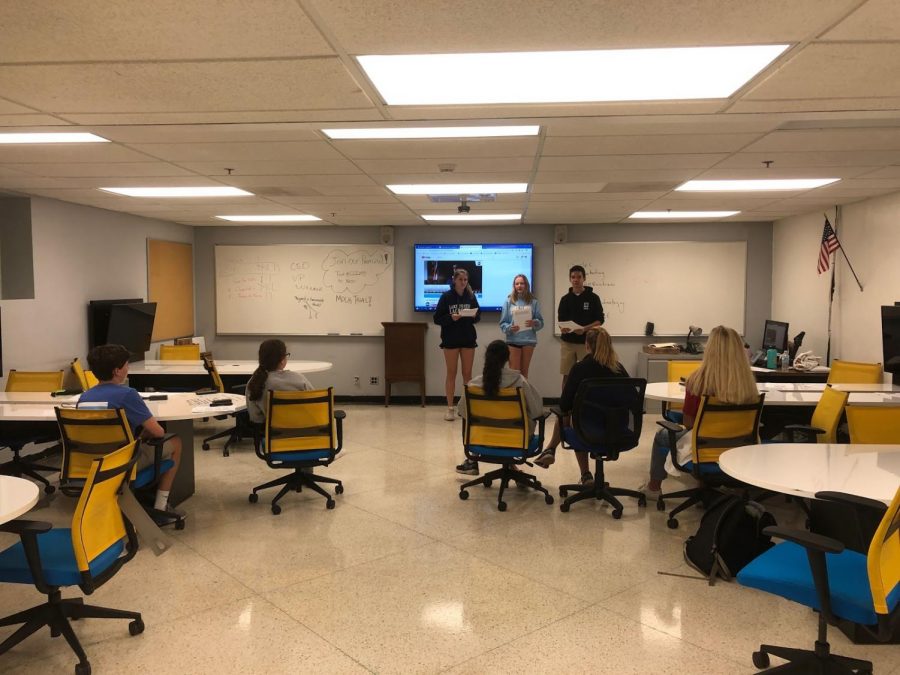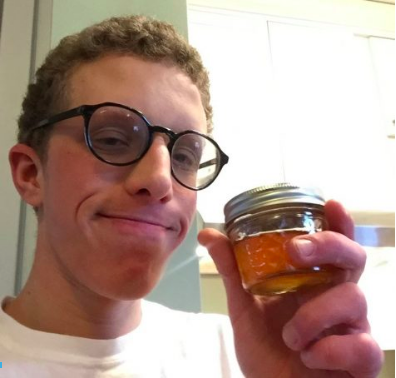The Case of Mock Trial
The prosecution (from left to right: senior Allie Wicks, sophomore Ava Graf, and senior Evan Jasica) presents their case to the judges as the defense attorneys — freshmen Connor Boyle and Bernadette Petty — look on.
October 10, 2019
It is a calm and quiet evening in suburban Illinois. Birds are chirping. Children are playing frisbee in the yard. Then the roaring of a chainsaw brings it all crashing down. A woman screams. Then, silence.
Thus it came to pass that Daniel Green, 37, murdered Shelly Green, his wife of ten years — at least according to the prosecution at the most recent meeting of Mock Trial Club. Seniors Isabella Graf, Sydney Leonardi, Emma O’Connor, Willow Volkert, and Courtney Woloson launched the club earlier this year with the help of law teacher Jessica Cole.
The club’s founders said they were inspired to organize Mock Trial by their experiences in the law curriculum, which consists of a full-year course that students can elect to take for honors credit. All five have either taken or are currently enrolled in Law Honors and the club is “similar” to the class, Ms Cole said.
“We… found our passion for law through this class together,” Graf said. The group thought it could be “a valuable addition to the club atmosphere at the school,” she continued.
Mock Trial initially faced difficulties due to its similarities with Debate and Model UN, but those have since been resolved and the club is now in the school’s pilot program, its leaders said.
“While it is similar to both Model UN and Debate, there are just so many aspects of it that are different,” Leonardi said. “It’s something that’s very valuable to have at the high school.”
Such is the traditional refrain from clubs of all stripes, from Environmental Club to Young Americans for Freedom to Hack Club. Each considers itself unique and contributing something all its own to the student body.
All clubs, however, provide a space for freshmen and other new students to acclimate to the unfamiliar tempo of high school life. In this, Mock Trial succeeded, according to freshman Bernadette Petty.
“You meet a lot of new people, make new friends — it’s really nice,” Petty said.
All clubs addition In Mock Trial’s case, it is competing with other high school teams for eternal fame and glory.
“In the future we are planning on being a part of the Illinois State Bar Association and competing with other schools,” Graf said.
The Illinois State Bar Association, which bills itself as the “premier legal organization” in the state of Illinois, hosts multiple Mock Trial competitions for high school and college students each year. The most prestigious of these is the statewide Mock Trial Invitational, held at the University of Illinois College of Law in Champaign.
O’Connor, Graf, and Leonardi said that they were not planning on bringing the club to the invitational this year; instead, their goal as seniors is “to find underclassmen to keep the club going,” O’Connor said.
“We want to impart [our] knowledge,” Leonardi said, “so that in the future they can bring the club to that level.”
The club also functions as a part of the alliance of civically-oriented clubs that includes Model United Nations, Debate, the erstwhile New Voters Club, and now Young Americans for Freedom and the High School Democrats of America.
An integral part of its mission is to “create this culture of people who want to be lawyers, who are really passionate about law, that really want to partake in criminal justice and the trial system in a Mock Trial activity and people that want to put all their knowledge to the test,” Leonardi said.
As part of creating that culture, the club’s leaders said that they were endeavoring to make Mock Trial as inviting as possible.
“You don’t have to have the biggest background in law, you don’t have to have taken Law Honors, you don’t have to be in Law now,” Leonardi said. “You just have to [be] willing to work and willing to learn.”
At the Mock Trial meeting of Wednesday, Sept 25, the club leaders briefly introduced members to prima facie, mens rea, and a variety of other Latin-derived legal terms.
Then the trials began, pitting a team comprised of sophomore Ava Graf and seniors Evan Jasica and Allie Wicks against freshmen Connor Boyle and Bernadette Petty.
“It was a fun activity to learn and practice,” Jasica said. “I like just diving right into everything, just learning as we went… it otherwise would feel too much like a class.”
The two teams rotated between prosecution and defense. Both defenses succeeded; both prosecutions failed, a reflection of the maxim “innocent until proven guilty” and the difficulty of convicting someone of a crime under the American legal system.
Yet at a broader level, forcing the teams to alternate between prosecution and defense taught them how to look at the facts from different perspectives, a sorely-needed skill in today’s trying times. It was “very eye-opening to be on both sides,” Petty said.







